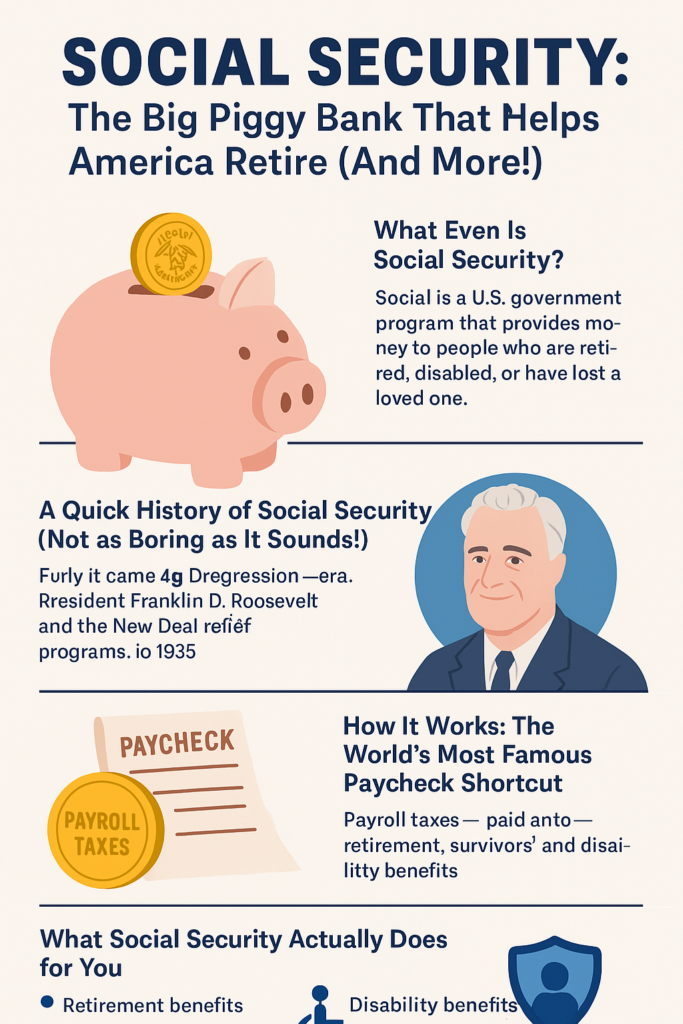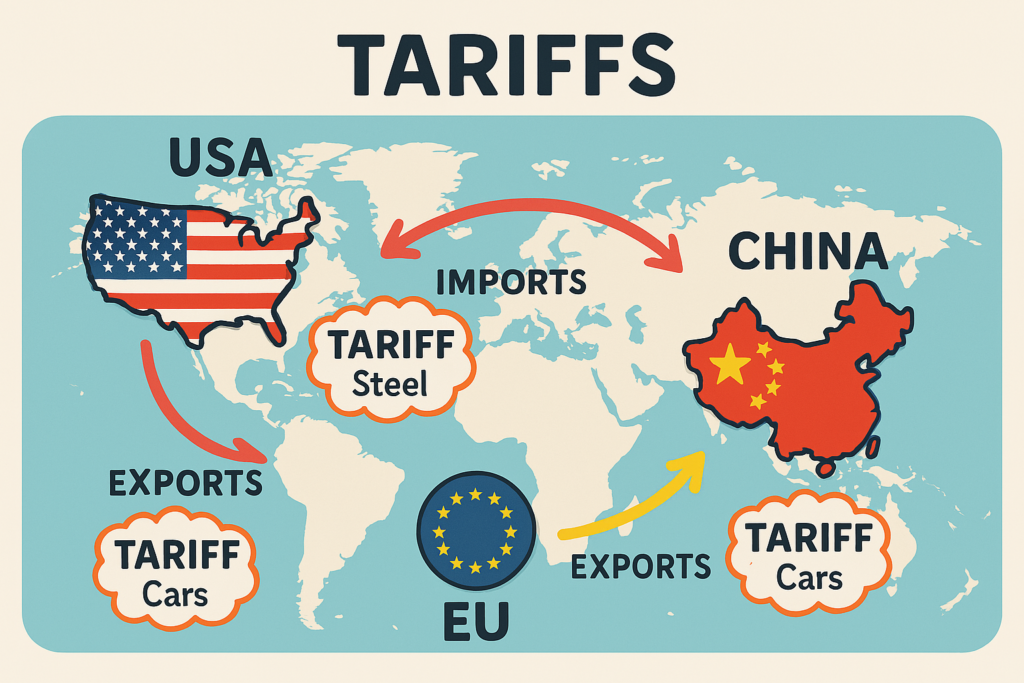
Let’s kick things off with a question: What if the government promised to help you out with money when you get old, get hurt, or something bad happens to your family?
That’s basically what Social Security is. It’s a program run by the U.S. government that helps people who are retired, disabled, or have lost a loved one who worked. Think of it as a really, really big safety net for millions of Americans.
But here’s the twist: It’s not just free money. Nope! People earn it by working and paying taxes. You’ve probably heard adults complain about something called “FICA” being taken out of their paycheck. That’s the Social Security tax.
Let’s break this down like a PB&J sandwich:
You work a job (paper route, TikTok empire, future CPA—whatever).
You get paid.
A chunk of your paycheck is taken out and sent to the government.
When you’re older (or something happens), you can get some of that money back—plus more!
Sounds simple enough, right? Now let’s rewind and find out how this whole thing started.
A Quick History of Social Security (Not as Boring as It Sounds!)
Back in the 1930s, America was having a really rough time. Picture this: jobs were vanishing, banks were failing, and people were standing in giant lines just to get food. This super-bad time was called the Great Depression. It was like a massive, economy-sized “oops.”
President Franklin D. Roosevelt—let’s call him FDR—came up with a bunch of new programs to help people get back on their feet. One of his big ideas was Social Security.
In 1935, FDR signed the Social Security Act into law. The idea was simple but powerful: if people paid a small part of their paycheck into a government fund while they were working, they could get payments later when they were too old to work.
Basically, it was “save now, survive later”—but with help from the whole country.
At first, it only covered retired workers. But over the years, Social Security grew to help:
People with disabilities
The families of workers who died
People who lose their job (unemployment insurance started as part of the same act!)
So today, it’s not just for grandmas and grandpas—millions of Americans of all ages depend on it.
How It Works: The World’s Most Famous Paycheck Shortcut
Okay, here’s where it gets kinda technical—but don’t worry, we’ll make it easy.
When someone says “Social Security,” they’re really talking about a huge system that’s powered by something called payroll taxes. That’s money taken out of workers’ paychecks before they even see it.
This money goes into two major trust funds:
One for retirement and survivors’ benefits
One for disability insurance
Every time you see “FICA” on a pay stub (ask your parents to show you one), that stands for: Federal Insurance Contributions Act. That’s the tax law that makes Social Security possible.
Here’s how the money magic works:
You work and pay Social Security taxes.
That money goes into the Social Security trust funds.
The government uses it to pay people who are getting benefits right now.
When it’s your turn—boom! You get benefits, too.
So no, the money you pay doesn’t just sit there with your name on it. It goes to today’s retirees, and the next generation will pay for you. It’s kind of like one giant community piggy bank.
Also important: You don’t get benefits right away. You need to earn credits. In 2025, you earn one credit for every $1,730 you make (that number changes a little every year), and you can earn up to four per year. You usually need 40 credits (about 10 years of work) to qualify for retirement benefits.
What Social Security Actually Does for You
Social Security helps in three main ways:
- Retirement Benefits
When you hit a certain age (between 66 and 67, depending on when you were born), you can start collecting monthly checks. You can also start as early as age 62, but you get less money if you do.
These checks help people afford groceries, medicine, rent, and even some fun stuff too. For some retirees, Social Security is the only income they have.
- Disability Benefits
If you become seriously disabled and can’t work anymore, Social Security might help. It’s called Social Security Disability Insurance (SSDI). You have to prove you can’t work and have enough work credits, but once approved, it provides steady money every month. - Survivor Benefits
If someone who worked and paid into Social Security dies, their family—like a spouse, child, or even parent—might get survivor benefits. It’s a way to keep families afloat after loss.
Why Social Security Is Kinda Awesome
It Helps People Retire with Dignity
Social Security is the main source of income for millions of older adults. For 4 in 10 retirees, it provides at least 90% of their income.
It Fights Poverty
Social Security lifted over 22 million Americans out of poverty in 2023, including 15 million seniors and more than 1 million children.
(Source: cbpp.org)
It’s Not Just for Retired People
Roughly 1 in 3 recipients is not retired. They’re children, survivors, or people with disabilities.
But Hey, It’s Not Perfect
People Worry It Might Run Out
The trust fund may run low around 2034, but the system will still collect taxes and could pay about 77% of benefits unless Congress acts.
It Doesn’t Replace All Your Income
Social Security replaces about 40% of your paycheck. You still need savings like a 401(k), IRA, or a side hustle!
Some Say It’s Unfair
Because the system is progressive, lower earners get more in return (percentage-wise) than high earners. That can be good or bad, depending on your view.
How Social Security Compares Globally
Germany has a strong worker-funded pension system.
Canada uses both a public pension and a means-tested safety net.
Japan, the UK, and others use similar models with some private options too.
America’s system is solid, but not the best-funded or most generous. Still, it covers nearly everyone and adjusts for inflation.
Is Social Security Going Away?
Short answer: No.
Long answer: It may change. Congress might:
Raise the payroll tax cap
Increase retirement age
Adjust formulas for high earners
But it’s highly unlikely Social Security will just disappear.
How to Make Social Security Work for You
Know What You’re Paying
FICA taxes: 6.2% from your paycheck goes to Social Security. If self-employed? You pay 12.4%.
Track Your Earnings
Create an account at ssa.gov/myaccount. Check every year. Fix any errors early!
Save Extra
401(k), IRA, Roth IRA for teens—even a savings account helps. Compound interest = money magic.
Understand Retirement Ages
Early: 62 (lower benefit)
Full: 66–67
Delayed: 70 (bigger benefit)
Can Kids Get Social Security?
Yes! If a parent dies, becomes disabled, or retires, kids may get survivor or dependent benefits. Over 4 million children receive benefits.
Busting Social Security Myths
Myth: “Social Security is going broke.”
Truth: It needs fixes, but it’s not vanishing.
Myth: “It’s a savings account.”
Truth: It’s an insurance program.
Myth: “I won’t get benefits because I’m young.”
Truth: If you work and pay in, you’ll qualify.
Resources to Stay Informed
Check your benefits or earnings
Retirement estimator tool
Disability info
Survivor benefits
FAQs
Final Word: Why This Matters Now
Even if retirement feels super far away, Social Security is one of the most important systems in your future life.
It gives you safety
It supports your family
It pays off if you understand how it works
So learn it, check your account, save what you can, and get ready to be the smartest person in the room—especially when people start talking about Social Security at Thanksgiving.
Because knowing how to use Social Security? That’s some serious fiscal means.

 Previous post
Previous post
 Next post
Next post


